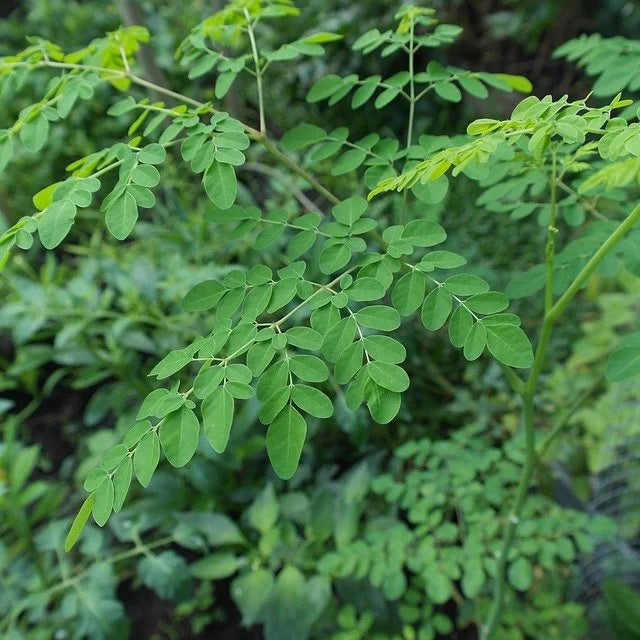Nigeria's Moringa "culture"
The interest in Moringa oleifera or Moringa for short, also known as drumstick or miracle tree, has grown steadily among people worldwide after the plant found its way into mainstream wellness culture.
According to Google Trends, the plant, has within five years, become one among the five most trending super foods - with experts predicting that its relevance has come to stay and will continue to grow.
How far has the interest grown in Nigeria?
In Nigeria, the plant is not new, but has been part of many people's daily food for decades. How it is being cooked or used mainly depends on different cultures and traditions.
In the northern part of Nigeria, where it is similarly called Barambo or Zogale, it was learned from people interviewed, that the interest on the plant was already ingrained in their menus, which is also still growing - including among Nigerians who were not using or eating it before.
This research found that, while some used it as food where it is either boiled, mixed with pepper, oil, onion and other ingredients, or cooked as soup, with beans, and sometimes, with okro or even fish, among many others.
Others preferred the seeds, but may also use other parts of the plant, for medicinal purposes.
'I have been eating it for many years, ever since I was young. With the new knowledge about its importance to health, my interest for it grows every day. The only problem now is that my mother is no more with me, and my wife is unable to cook the way I like it. My mom is super in cooking that soup. I could remember sometime, she used to cook it like a medicine, greenish in colour with beans, okro and other ingredients. And it is always so delicious,' Mohammed Adamu, a 36 year old male of Margi tribe, said.
'I eat Moringa as soup whenever I come across it, but it is not my favorite. The seed is very important to me. I eat it raw as medicine, because I am a hypertensive,' Bala Musa, a 55 year old male, from Maiduguri, said.
'In the past, we used to cook it with "toka" (local potash obtained from ash), without Maggi (seasoning) and oil, and it is always delicious,' Amina Samaila, a 60 year old female, from Maiduguri, said.
The best way to use it
A study by a researcher, and the lead in this report, Dr. Moses Ekong of the University of Uyo, Nigeria, stated that a large number of people in other countries also depend on the plant for its nutritional and medicinal purposes. He observed that more people are getting the awareness of its importance, and how it can be used either as food or as medicine, Hence, its demand will continue to rise.
'Many people consume Moringa based on information at their disposal as a commonplace plant in their environment. However, Moringa is worth far more, as its usefulness is determined by the parts or state of the plant consumed at a given time,' Dr. Ekong's findings indicate.
He also stated that considering the importance of the plant, awareness is much more needed to encourage its usage among people.


Moringa Drumstick
What it is known as in different Nigerian cultures and their uses
'Moringa belongs to the plant family Moringaceae. Its common names include ‘miracle tree’, ‘drumstick tree’ because of the long slender (triangular seed-pods), ‘horseradish tree’ from the taste of the roots, and ‘benzolive tree’ from the oil derived from the seed. In local Nigerian languages, Moringa is known as ‘Barambo’ in Hausa, ‘Odudu Oyibo’ in Igbo and ‘Ewele’ in Yoruba.
The plant is utilized widely among these different ethnic groups in Nigeria; the leaf, seed, flowers and the stem and root barks of Moringa are used as food, tea and medicine. Other parts can be utilized in fencing and as fuel for cooking.'
But Dr Ekong further explained that 'to achieve maximum nutrients, boiling is more effective as it reduces the toxic contents, and that Moringa can be preserved after harvest without a change in its nutritional value by not allowing it to dry out. An overdose of Moringa may cause high accumulation of iron, which can cause gastrointestinal discomfort and tissue iron deposit. Hence, a daily dose of 70 g of Moringa is suggested to be good and prevents over accumulation of nutrients.' However, he noted that if one has underlying health issues, it is best to consult with a physician first.
'The chemical compositions of Moringa are known to protect against damage to the body and cancer, as well as having other abundant benefits to the human system as a whole.
'Moringa is rich in all classes of food; carbohydrate, protein, oil, vitamins and minerals, which are very important to the human and animal health. Compared to most other plants, Moringa is richer in vitamins, minerals and proteins, and other plant constituents. For example, South African cultivated species of Moringa showed higher antioxidant constituents in the leaves compared to cabbage, spinach, peas (beans), cauliflower and broccoli, meaning that it has more body tissue protection ability than these other vegetables.
'Most vitamins: A, B, C, D and E are present in Moringa. These vitamins are important in many body processes, including protection of cells of the body, digestion of food, good eye sight and strong bones and teeth. Their deficiency results in so many different disease conditions. The leaves of Moringa contain ten times more vitamin A than carrots and seven times more vitamin C than oranges.
'Minerals like calcium, potassium, zinc, magnesium, iron and copper found in the leaves of Moringa are very necessary for body cell activities. These leaves contain seventeen times more calcium than milk; fifteen times more potassium than bananas, twenty five times more iron than spinach; and nine times more protein than yoghurt.
The nutritional value of Moringa is higher in the dry leaves, except for vitamins C and E which is much higher in the fresh leaves. The seeds also have high amounts of nutrient second to the leaf, except for fat, protein, magnesium, cupper and vitamin E which are higher.
Other economic benefits
Moringa can be used as food; vegetables for consumption or tea for drinking. The leaves are used to prepare fatty foods, while the seed oil can be used for general culinary and as salad oil. Lactating women consume Moringa to enhance breast milk production.
The seed oil is used as perfumes and also for general lubrication purposes, while animal feed can also be prepared with Moringa. Medicinal uses also include traditional application to treat various diseases, including scurvy, tumours, sores, hysteria, and helminthic infection.
Moringa may be used for water purification for industrial and household purposes. Seed kernels of Moringa are reported to remove lead, iron and cadmium ions from contaminated water by a biosorption process through the metal-protein interactions. Besides reducing the turbidity of contaminated water, Moringa seeds also reduce the level of microorganisms during the same process where the bacteria are concentrated in the coagulated sediment.
Scientific Research
Different parts of the Moringa plant have health-promoting effects including brain protection against such condition as depression, diabetes and cancer protection, and reduction of body fat essential in body weight control. In heavy metal toxicity, Moringa can be used to protect against damage.
By Moses B,Ekong

